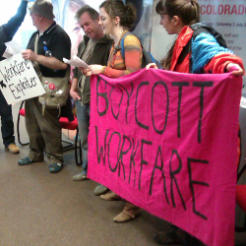Scope, Barnardo’s and the British Heart Foundation have all been criticised by campaign group Boycott Workfare after they were listed as being involved in programmes which require people to work for free or lose benefits.
Barnardo's has denied being involved, while the other two charities admitted taking people under the schemes - officially known as mandatory work activity and informally as workfare - but have said their involvement was against policy and involved isolated incidents.
The three charities' names appeared on a list of providers of placements as part of Community Work Placements organised by a local Groundwork charity.
Boycott Workfare has also criticised the Groundwork network for continuing to be involved in mandatory work activity.
Scope was particularly heavily criticised by Boycott Workfare as it had previously signed the Keep Volunteering Voluntary Agreement, a list which currently consists of 430 charities and voluntary organisations who have stated that they will not participate in government workfare schemes.
Scope said the Groundwork list refers to an isolated incident and that it had withdrawn from all mandatory work experience schemes for disabled people in December 2012.
A spokesman from the charity said: “It appears that there has been an isolated occasion this summer, in which a disabled person requested to gain work experience in a specific Scope charity shop, because their partner also independently volunteered there.
“This should not have happened, and we will reiterate to all of our shop managers that Scope does not accept people who are on a mandatory work scheme.”
Scope said that it chose to sign the Keep Volunteering Voluntary Agreement because it does not believe that compulsory placements and sanctions are the best way for disabled people to develop the skills and experience they need to find a job.
Barnardo’s said it would like to clarify that Groundwork is not an approved provider of placements for Barnardo’s, and that the charity does not accept placements from any providers under mandatory work activity, including the Community Work Placements and Help to Work programmes.
Gerald Cousins, head of retail at Barnardo’s, said: “Barnardo’s is against benefits sanctions, both in principle and in practice. We have successfully helped persuade the government to drop them for young people taking part in the Work Experience programme.
“We have implemented processes throughout our nationwide retail operation to ensure that individual shops do not take placements via the government’s Mandatory Work Activity scheme. Our position has been communicated to all shop managers.
“We are committed to helping the people furthest from the labour market to develop the skills needed to gain paid employment. This can take a number of routes, including through the voluntary elements of the government-funded Work Experience and Work Programme.”
BHF did not respond to an invitation to comment on why it was listed by Groundwork. However when replying to Boycott Workfare in a tweet it said it investigated why it had been listed and, as a result, ended three placements.
The charity added that it is working with its shops to ensure it doesn’t happen again, and is “dedicated to offering voluntary opportunities, and only genuinely volunteering ones”.
Groundwork responds
Groundwork charities have featured heavily in Boycott Workfare’s week of action, with the campaign group calling on the public to contact them in protest against branches of Groundwork taking part in Community Work Placements as sub-contractors of G4S, as well as its part in other workfare placements.
However, the charity has defended its involvement in such schemes by saying that helping people who need it most to get back into employment is a core part of Groundwork’s charitable remit.
Graham Duxbury, chief executive of Groundwork UK, said that the charity is proud to have supported over 6,000 people into education, employment or training last year. He said the charity also delivers a range of initiatives for individuals to build their skills and confidence, which include opportunities for them to volunteer their time with them.
Duxbury added: “Groundwork is a federation of trusts, each making their own decisions about which contracts and programmes to deliver based on their local focus and priorities. A number of Groundwork Trusts are engaged as subcontractors to prime contractors delivering Community Work Placements alongside a range of other central and local government programmes.
“Our experience tells us that intensive supervision and support in a work environment can be the right approach for some people and does deliver results, particularly where the work being done is bringing benefits to the community as well as the individual. We work with a range of organisations to try to deliver these benefits and are always transparent in our dealings with potential placement hosts as to the nature of the scheme.”
Boycott Workfare’s ‘week of action’
Boycott Workfare spent the last week campaigning against organisations involved in mandatory work placements, including those using the Community Work Placements scheme.
A spokeswoman at Boycott Workfare said: “Compulsory work placements backed by the threat of destitution couldn't be further from the voluntary sector's ethos. Hundreds of charities already recognise this and have pledged to shun workfare. Our action last week aims to expose those who continue to put people at risk of benefit sanctions, and call on them to join the growing consensus that workfare is completely unacceptable.”
The Department for Work and Pensions, which launched the Community Work Placements scheme in April, did not respond to an invitation to comment.
Community Work Placements is a mandatory scheme designed for people on Jobseeker’s Allowance whose key barrier to work is a lack of experience and motivation. The scheme involves claimants undertaking a full-time work placement for 30 hours a week for up to 26 weeks alongside a provider-led supported job search.









